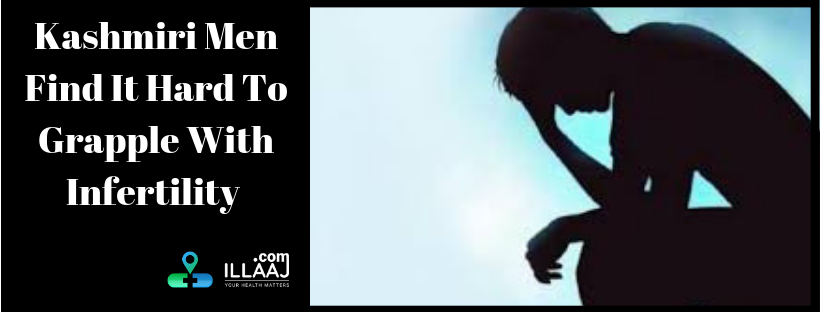Suhail Ahmad and Sameena were college friends before getting married in their early  thirties.
ÔÇ£I was one of those girls who are always tempted by presence of child in bus, street or anywhere. I always wanted to be a mother,ÔÇØ says Sameena
Both are now around 37 years old, and have 3-year-old son. TheyÔÇÖve found the journey to
parenthood ÔÇ£long and painful.ÔÇØ
ÔÇ£At 33 years of age, we had no baby and our friends were already onto their second child. We were wondering: WhatÔÇÖs wrong with us?ÔÇØ says Sameena.
Sameena and Suhail then went for medical checks up and what they ÔÇ£discoveredÔÇØ surprised them
ÔÇ£I automatically assumed it to be my problem and on asking by gynaecologist, underwent tests. The tests were normal,ÔÇØ she says.
┬áÔÇ£I was in depression for almost year, as I was unable to comprehend if I am normal than what is wrong.ÔÇØShe added
The couple consulted number of doctors before finally deciding to go for IVF (in vitro fertilization).
ÔÇ£The doctor (at IVF centre) suggested semen analysis,ÔÇØ says Sameer.
After hearing this, Smaeer says, ÔÇ£Men ego didnÔÇÖt allow me to undergo tests, so we went back to home and decided to consult any other clinic.ÔÇØ
After couple of days, Sameer went back to Rotunda Hygeia, KashmirÔÇÖs first IVF clinic, and agreed to get himself ÔÇ£tested.ÔÇØ
ÔÇ£As a male that was worst phase of my life but then I took it with positive approach.ÔÇØ
Reports, Suhail says, confirmed ÔÇÿunimaginableÔÇÖ: ÔÇ£My sperm count and motility was low.ÔÇØ
ÔÇ£I decided to undergo treatment without letting a sniff to my parents,ÔÇØ says Suhail.
The couple then had ÔÇÿICSI treatmentÔÇÖ in Rotunda Hygeia clinic but first phase of treatment ÔÇ£failedÔÇØ.
However, the couple didnÔÇÖt lose hope and went for another cycle of treatment and ÔÇ£today we are blessed with baby boy.ÔÇØ
ÔÇ£My son is my carbon copy, he is exactly like me. I am very happy I took that step and today my family is complete,ÔÇØ says Suhail.

Infertility affects both men and women alike even though many a times it is misconceived as a medical condition associated with fairer gender.
In Kashmir Valley, infertility affects an estimated 15 percent of all couples and according to experts, men account for half of it.
ÔÇ£Infertility does not mean sterility,ÔÇØ says Dr Ruheel Nissa, gynaecologist at KashmirÔÇÖs first IVF center Rotunda Hygeia here.
Every 45 days, ÔÇÿwell knownÔÇÖ embryologists from Mumbai are hired by Rotunda Hygeia to conduct a special workshop. A batch of eight couples is selected to undergo the in-vitro fertility (IVF) procedure. At a success rate of around 40 percent, three women in every batch ÔÇ£conceive.ÔÇØ
Dr. Ruheel says male infertility is taken as social stigma. ÔÇ£Men generally are hesitant to take fertility test because thereÔÇÖs such a stigma associated with it.ÔÇØ
ÔÇ£Men are not supposed to have low sperm counts,ÔÇØ Says Dr. Ruheel.
Last year, Ruheel says the clinic received 900 cases and in 480 couples, it was male who had
infertility. ÔÇ£Among the 480 couples, only 12 males decided to undergone treatment, says Dr. Ruheel .For such couples, Dr Ruheel says, special procedure called ICSI, or introcytoplasmic sperm injection is involved.
ÔÇ£In ICSI, we actually would take male sperm, find the very best-looking one and put it into each of females eggs (of her partner) so that we could take a single sperm, put it in a single egg, to help with fertilization. Ultimately, thatÔÇÖs what made the difference for them,ÔÇØ says Dr. Ruheel.
Some patients, Dr Ruheel says, have zero sperm count and for them TESA procedure (Testicular sperm aspiration) is done. ICSI costs about 1.5 lakh and has a success percentage of 30-40% ÔÇ£Success percentage is always 30-40percent. It would be a lie if someone says it is 100% success.ÔÇØ Dr. Ruheel adds.

Dr. Masrat, gynaecologist at SKIMMS, says that besides genetic causes, there are underlyingmedical conditions that account for male infertility. They include hormone abnormalities, varicoceles (varicose veins in the scrotum), obesity, drug use and exposure to radiation and chemotherapy.
Treatment options, she says, may include surgery, hormone therapy and assisted reproductive
technologies.
ÔÇ£Infertility is not always associated with females only. Of all infertility cases, approximately 40-50% is due to male factor infertility and as many as 2% of all men will exhibit suboptimal sperm parameters,ÔÇØ says Dr. Masrat.
She added: ÔÇ£It may be one or a combination of low sperm concentration, poor sperm motility, or abnormal morphology.ÔÇØ Main causes for infertility in men Dr. Ruheel says that she patients at the clinic are mainly farmers by profession.
ÔÇ£Use of fertilizers and pesticides decrease the sperm count and motility in males.ÔÇØ
Cigarette smoking is another factor for this, she says. ÔÇ£Smoking impairs sperm motility and
morphology and worsens the quality of a manÔÇÖs erections. Marijuana can cause DNA damage and lower sperm counts.ÔÇØ
Thirdly, she says, donÔÇÖt leave a laptop computer on your lap for long periods of time. ÔÇ£Prolonged or repetitive heat exposure can adversely affect sperm production.ÔÇØ
Untreated mumps during childhood, she says, can also be a cause of infertility among males.
The Story Was Earlier Published On The INS (Indian News Service)

